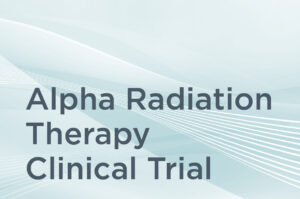
Updated on October 31, 2025
Early clinical trial results show that AlphaMedix™ (212Pb-DOTAMTATE), an investigational targeted alpha therapy, achieved all of its main goals and produced clinically meaningful benefits for adults with advanced gastroenteropancreatic neuroendocrine tumors (GEP-NETs).
The therapy showed positive results both in patients who had never received peptide receptor radionuclide therapy (PRRT) and in those whose cancer had returned or progressed after prior PRRT.
The findings from the Phase 2 ALPHAMEDIX-02 trial were announced by Orano Med, the company developing AlphaMedix, ahead of the 2025 European Society for Medical Oncology (ESMO) Congress in Paris.
About AlphaMedix™
AlphaMedix is a targeted alpha emitter that delivers a highly potent radioactive isotope, lead-212 (212Pb), directly to tumor cells expressing somatostatin receptors, which are commonly found on NET cells. Once attached, the therapy emits short-range alpha particles that can kill cancer cells with precision while minimizing damage to surrounding healthy tissue.
Based on positive outcomes from phase 1 and ongoing phase 2 trials, the U.S. Food and Drug Administration granted breakthrough therapy designation to AlphaMedix in early 2024, marking it as the first targeted alpha therapy to receive this status.
In the current Phase 2 study, AlphaMedix led to measurable tumor responses and met predefined safety criteria. Patients new to PRRT and those previously treated experienced prolonged periods of disease control and meaningful improvements in key measures such as progression-free survival and overall survival. Importantly, AlphaMedix had a manageable safety profile across both groups.
These results suggest that lead-212–based alpha therapy may represent a promising new approach for patients with metastatic or inoperable GEP-NETs who need more effective treatment options.
What This Means for Patients
While the results are encouraging, AlphaMedix is still an investigational therapy and has not yet been approved for use outside of clinical trials. The data from this study represent an important step in demonstrating that alpha-emitting radionuclides like lead-212 can be used safely and effectively in targeting NETs.
If future studies confirm these benefits, targeted alpha therapy could offer a next-generation treatment option for patients. Because alpha particles travel only a short distance in the body, this approach may help deliver radiation precisely to cancer cells while limiting side effects and damage to surrounding tissues.
Patients interested in emerging NET therapies should speak with their care team about ongoing clinical trials and whether participation might be appropriate for them.
What’s new from the 2025 NANETS Symposium
(Updated 10/31/25)
At the 2025 North American Neuroendocrine Tumor Society (NANETS) Symposium, updates from the phase 2 ALPHAMEDIX-02 trial were presented. AlphaMedix led to tumor shrinkage in about 60% people who hadn’t had PRRT before and in about 35% of those previously treated, with many others seeing their disease stay stable. Time without growth also looked encouraging, with roughly 70-75% of PRRT-naïve patients still progression-free at around 3 years, and about 83% of previously treated patients were progression-free at 18 months.
Side effects were mostly mild (fatigue, nausea, hair thinning), but doctors are watching for a few less common issues, including kidney problems that can appear later and an unexpected swallowing problem (dysphagia/achalasia) in some patients. Learn more about the trial updates and side effect profiles observed here and here.
Search for neuroendocrine cancer clinical trials using our Clinical Trials Finder.
